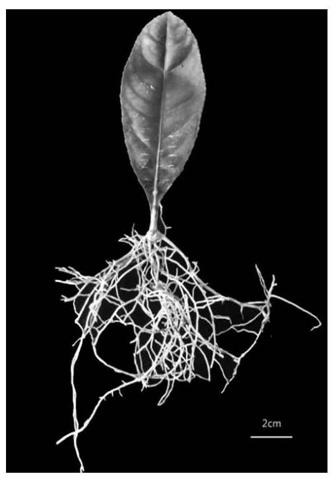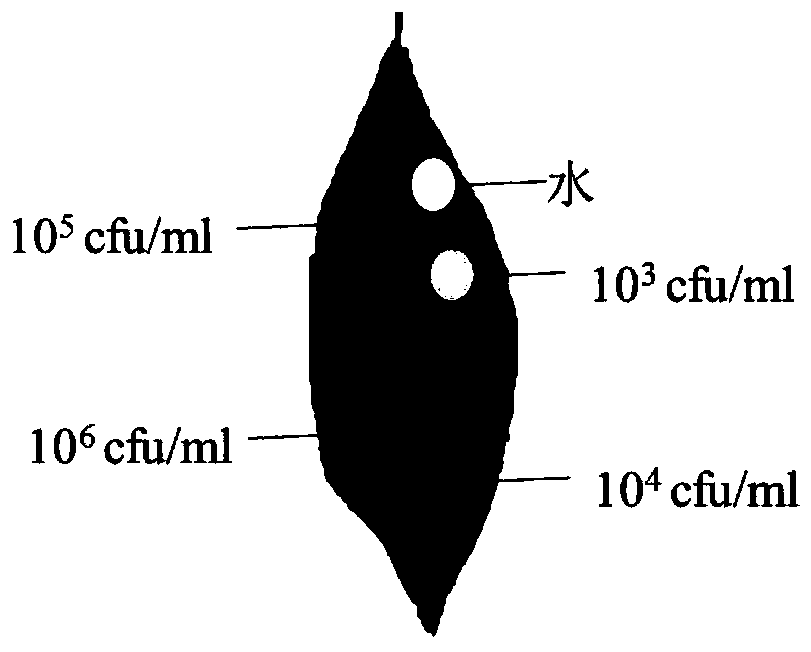Rapid inoculation and identification method for citrus bacterial canker disease
A technology of citrus canker and its identification method, which is applied in the field of rapid inoculation and identification of citrus canker, can solve the problems of insufficient leaf nutrient and water supply, complex management of water, fertilizer and pests, and large space for cultivation environment, and achieve rapid and efficient screening, The identification results are reliable and the effect of reducing the influence of environmental factors
- Summary
- Abstract
- Description
- Claims
- Application Information
AI Technical Summary
Problems solved by technology
Method used
Image
Examples
Embodiment 1
[0027] The operation steps of this embodiment are as follows:
[0028] (1) Sample collection: Pick 3 tender leaves that have reached the maximum leaf area but not completely turned green from the shoots of the plant, put them in a ziplock bag and mark the samples; each identification uses the disease-resistant variety Citron C -05 and the susceptible variety Bingtang Orange as control;
[0029] (2) Cultivation of pathogenic bacteria: pick a single colony of ulcer disease from the preserved solid medium plate, add 20 mL liquid LB medium, shake culture in a constant temperature shaker at 28°C, 200 r / min for 20 h, use sterile water Dilute the pathogen suspension to 10 3 , 10 4 , 10 5 , 10 6 cfu / ml;
[0030] (3) Identification of ulcer inoculation of the sample: After the sample is taken back to the laboratory, wipe the front and back of the leaf with alcohol cotton, turn the leaf over until the back of the leaf is facing upwards. After the alcohol evaporates, use a 1 mL syringe needle ...
Embodiment 2
[0035] (1) Sample collection: Pick 3 tender leaves that have reached the maximum leaf area but not completely turned green from the plant shoots, put them in a ziplock bag and mark the samples; each identification uses the disease-resistant variety Citron C -05 and the susceptible variety Bingtang Orange as control;
[0036] (2) Cultivation of pathogenic bacteria: pick a single colony of ulcer disease from the preserved solid medium plate, add 20 mL of liquid LB medium, shake culture in a constant temperature shaker at 28°C, 200 r / min for 20 h, use sterile water Dilute the pathogen suspension to 10 3 , 10 4 , 10 5 , 10 6 cfu / ml;
[0037] (3) Identification of ulcer inoculation of the sample: After the sample is taken back to the laboratory, wipe the front and back of the leaf with alcohol cotton, turn the leaf over until the back of the leaf is facing upwards. Puncture a small hole (do not pierce the leaf), and then inject the resuspended bacteria liquid into the mesophyll tissue ...
PUM
 Login to View More
Login to View More Abstract
Description
Claims
Application Information
 Login to View More
Login to View More - R&D Engineer
- R&D Manager
- IP Professional
- Industry Leading Data Capabilities
- Powerful AI technology
- Patent DNA Extraction
Browse by: Latest US Patents, China's latest patents, Technical Efficacy Thesaurus, Application Domain, Technology Topic, Popular Technical Reports.
© 2024 PatSnap. All rights reserved.Legal|Privacy policy|Modern Slavery Act Transparency Statement|Sitemap|About US| Contact US: help@patsnap.com










